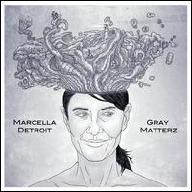In late 1988, she united with Siobhan Fahey (formerly of Bananarama) to form Shakespear's Sister. In 1989, the duo's second single, You're History, became a Top Ten hit in the U.K., as did Sacred Heart, the full-length debut from which it was taken. The 1992 follow-up Hormonally Yours was even more successful, with the lead single, the moody, melodramatic ballad Stay becoming a massive world-wide smash, topping the charts in the U.K. and climbing into the Top Five in the U.S. Despite charting four other tracks from Hormonally Yours in the U.K., including the Top Ten I Don't Care, Shakespear's Sister split in 1993, and Detroit pursued a solo career. She duetted with Elton John on the staple Ain't Nothing Like the Real Thing for his Duets set (the song would also appear on her solo debut, Jewel, the following year). Although Jewel would fail to have the commercial success of her work with Shakespear's Sister, Detroit continued to be active throughout the rest of the decade, releasing Feeler in 1996 and Abfab Songs three years later. In 2001, Detroit returned with Dancing Madly Sideways. ~ Tom Demalon, Rovi
Marcella Detroit
from Detroit, MI
June 21, 1959 (age 66)
Biography
Although not necessarily a household name to most music fans, Marcella Detroit's career has been diverse and highlighted by success as a solo artist, one half of Shakespear's Sister, and performing, both live and in sessions, and writing with some of the biggest names in rock and pop. Born Marcy Levy on June 21, 1959, in Detroit, MI, she would later take the city of her birth as her stage name. Detroit's first break was performing with another native of her hometown, Bob Seger, in the early '70s. She became a part of Eric Clapton's band in the mid-'70s, touring with him as a backup vocalist and appearing on albums like Slowhand and Backless. Detroit was also writing with Clapton, including Lay Down Sally, which reached number three and sold a million copies in 1978. She left Clapton's band to pursue a solo career, although she would appear with him at Live Aid in the summer of 1985, and relocated to Los Angeles. During this time, she would write songs for artists including Chaka Kahn, Al Jarreau, and Philip Bailey, and continue to work as a session vocalist for, among others, Aretha Franklin, George Duke, and Bette Midler.
Top Tracks
Albums
Videos
Close

















